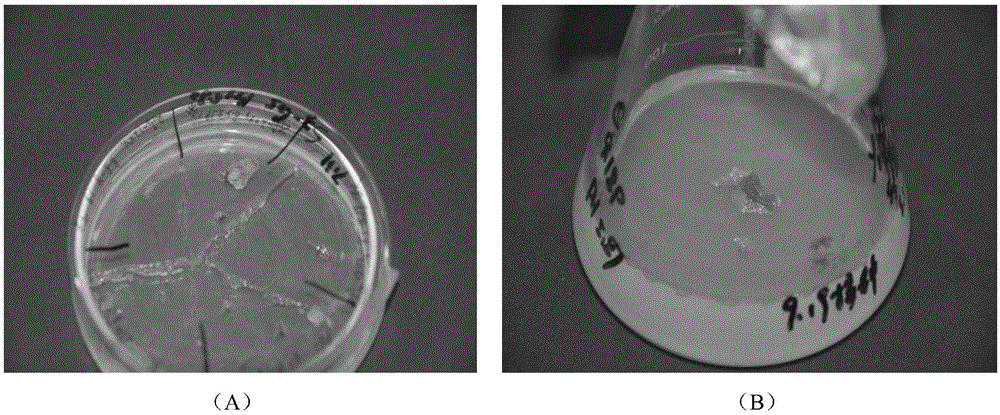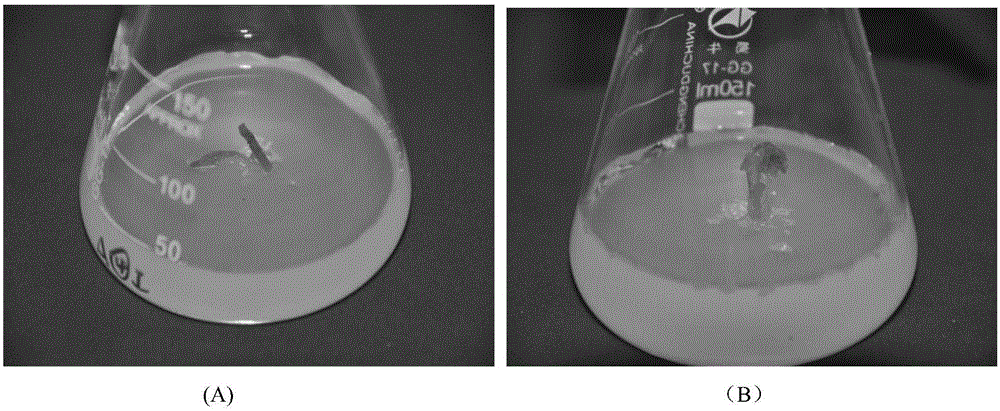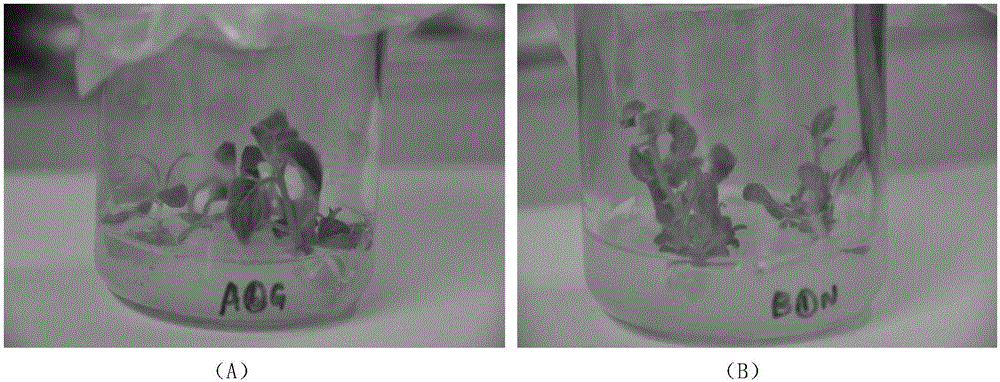Method for obtaining sesame distant hybrid progeny through adopting immature embryo saving
A technology of immature embryo rescue and distant hybridization, applied in horticultural methods, botanical equipment and methods, applications, etc., can solve problems such as hybridization is not fruitful, hybrid plants cannot be obtained, and hybrid embryos are aborted, so as to overcome incompatibility Effects of sex, improved germplasm, and enriched genetic base
- Summary
- Abstract
- Description
- Claims
- Application Information
AI Technical Summary
Problems solved by technology
Method used
Image
Examples
Embodiment 1
[0037] A method for obtaining distant hybrid offspring of wild sesame and cultivated sesame by using immature embryo rescue technology, comprising the following steps: (1) parental material preparation: the female parent selects a comprehensive trait comparison of 40-50 days from sowing to flowering. For a good sesame cultivar 'Zhongzhi 14' (2n=26), the male parent is a wild sesame species 'Yezhi 3' (S. prostratum, 2n=58);
[0038] (2) Distant hybridization: when both parents are in bloom, remove the white corolla and stamens of the female parent, and list them; use the male parent to pollinate, record the number of hybrid flowers, and the number of pollinated capsules;
[0039] (3) Stripping of ovules: Select young capsules of different developmental stages such as after cross-pollination respectively, rinse their surfaces with clear water, disinfect the surface of young capsules with 75% alcohol for 30 seconds under an ultra-clean workbench, and then use 3% Disinfect with so...
Embodiment 2
[0052]The method described in this example to use the immature embryo rescue technology to obtain the distant hybrid offspring of wild sesame and cultivated sesame is basically the same as that of Example 1, the difference is that: (1) the immature embryo induction medium is: based on MS Add 0.5mg / LIAA, 1mg / L6-benzylaminoadenine, 30g / L sucrose and 8g / L agar in the medium, and the pH value of the medium is 5.8; the differentiation medium is: add 0.3mg / LIAA, 0.6mg / L6-benzylaminoadenine, 30g / L sucrose and 8g / L agar, the pH value of the medium is 5.8; (2) the immature embryo rescue in vitro induction culture and immature embryo differentiation culture The conditions are: temperature 28~30°C, photoperiod 8h / d, light intensity 2000lux; (3) The rooting medium is: add 0.5mg / LNAA, 0.3mg / LIBA, 30g / L sucrose and 8g / L agar, the pH value of culture medium is 5.8; Described proliferation medium is: add 3mg / L6-BA, 2mg / LIAA, 30g / L sucrose and 8g / L agar in MS basic medium , the pH of the med...
Embodiment 3
[0055] A method for obtaining distant hybrid offspring of wild sesame and cultivated sesame by using immature embryo rescue technology, comprising the following steps: (1) parental material preparation: the female parent selects a comprehensive trait comparison of 40-50 days from sowing to flowering. For good Congo wild sesame (S.schinzianum2n=64), the male parent is semi-wild sesame (S.malabaricum2n=26) 'Yezhi 2';
[0056] (2) Distant hybridization: when both parents are in bloom, remove the white corolla and stamens of the female parent, and list them; use the male parent to pollinate, record the number of hybrid flowers, and the number of pollinated capsules;
[0057] (3) Stripping of ovules: Select young capsules of different developmental stages such as after cross-pollination respectively, rinse their surfaces with clear water, disinfect the surface of young capsules with 75% alcohol for 30 seconds under an ultra-clean workbench, and then use 3% Disinfect with sodium hyp...
PUM
 Login to View More
Login to View More Abstract
Description
Claims
Application Information
 Login to View More
Login to View More - R&D
- Intellectual Property
- Life Sciences
- Materials
- Tech Scout
- Unparalleled Data Quality
- Higher Quality Content
- 60% Fewer Hallucinations
Browse by: Latest US Patents, China's latest patents, Technical Efficacy Thesaurus, Application Domain, Technology Topic, Popular Technical Reports.
© 2025 PatSnap. All rights reserved.Legal|Privacy policy|Modern Slavery Act Transparency Statement|Sitemap|About US| Contact US: help@patsnap.com



